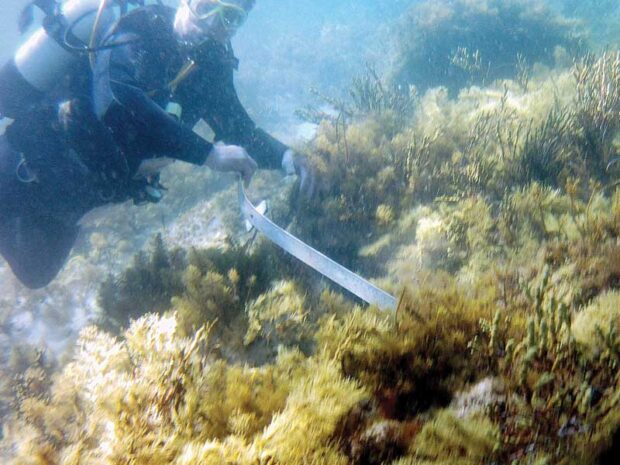Gaining Skills for Citizen Science
By Heather Creech

Sport divers are working with marine science organizations in nearly every region of the world to document the state of our ocean ecosystems. But getting those observations is challenging. In addition to identifying local marine life, volunteer divers need to be able to manage currents and low visibility while handling cameras, transect lines, and other monitoring gear.
So how does an open water diver with a passion for the ocean but no prior scientific background acquire the necessary knowledge and skills? Is there such a thing as a diver-training course that leads to a specialty in citizen science?
To date, the options are limited. PADI and NAUI offer specialties in underwater ecology for divers wishing to learn more about marine ecosystems. But these are largely one day, on-land courses, without the skills development for collecting observations underwater.
Customized Training
Consequently, many organizations have developed their own customized tools and training. At the most basic level, groups such as CoralWatch (coralwatch.org) provide background reading, identification slates, and mobile apps to encourage divers to record and report what they see whenever they are underwater. Such projects are important crowd sourcing efforts to build large databases of observations from around the world.
But there are a growing number of more advanced programs. Ocean Sanctuaries has teamed up with Reef Environmental Education Foundation (REEF) to create a two-stage Marine Citizen Science Certificate (www.oceansanctuaries.org/marine-citizen-science-certificate/). The first part is a free online course that covers the skills needed to conduct citizen science activities in the field: “It emphasizes techniques for measurement and observations of wildlife and other natural phenomena and how to accurately record them along with necessary contextual data.” Part 2 requires you to sign up to REEF’s California or Pacific Northwest marine life identification programs, take their fish ID quiz, and collect and submit observation data from at least two recreation dives. It is possible that in future other regions covered by REEF will be included in the certificate program.
Groups like Reef Check (www.reefcheck.org) and the University of British Columbia Aqua Society (UBCAS) have gone a step further, and include formal training dives in their citizen science training programs so that divers get hands-on instruction in observation techniques, sampling methods, and bottom composition surveys. But these types of programs are usually designed to support projects run by those organizations. Reef Check’s training is customized for monitoring tropical coral reefs abroad or the temperate reefs of the California coast. Upon completion, divers can become Reef Check surveyors on designated Reef Check sites around the world. UBCAS’s program focuses primarily on projects in the Howe Sound, near Vancouver, BC.
Training Agencies
Of the main diver training agencies, it appears that only Global Underwater Explorers (GUE) offers a citizen science-related specialty for open water divers—the Documentation Diver certificate. Their program is “designed to introduce divers to the basics of documentation techniques, project organization, and logistics that are useful in general project-based diving”. The course takes four days, including six dives, and covers data collecting, survey techniques, and photography and video skills.
Having such a wide range of citizen science training opportunities is important, given that the skills and interest levels of divers themselves vary so much. As Michael Bear at Ocean Sanctuaries cautions, “We have to be realistic about the reach of such programs—I think the key is reducing the complexity and underwater work involved”. Still, with the growing demand for citizen science divers, it may be time for more diving certification agencies to develop specialty courses with training dives for aspiring citizen scientists—courses that will then allow many more divers to adopt their own local sites for long term monitoring and conservation.
Other Options
If there is no course available near you, what else can you do? First and foremost, do more diving! Being a safe and competent diver is essential, ensuring that you are mindful of depth, air, and time while you are taking photos, setting transect lines, or recording notes on a slate. Second, improve your species identification knowledge. Ask lots of questions, invest in some good reference books and explore marine life websites and crowdsourcing sites such as iNaturalist (www.inaturalist.org). Finally, look for projects near you where even with these basic skills you can help out as a citizen scientist—talk to your local dive shop and check with local conservation organizations. Learning by doing can get you started as a citizen scientist, even without more formal training.
Heather Creech is a citizen scientist with ReefWatch, dividing her time between Victoria, BC, and Adelaide, South Australia. To contact her: citizensciencereport@gmail.com







